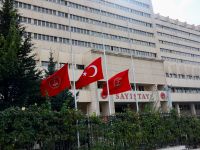In the last three years, Jordan has reformed its capital market to conform to international standards and practices, a move that encouraged the International Organization of Securities Commissions (IOSCO) Emerging Markets Committee meeting to convene in Amman.
The five-day meeting, the first in the region, marks a milestone for the Jordan Securities Commission (JSC) and recognizes its key role in the modernization process, organizers agree.
Against this backdrop, international securities regulators gathered to discuss the Regulatory and market changes in the Africa/Middle East region, particularly the new developments, constraints and opportunities for the Arab world.
Chief Economist for the Middle East Capital Group in Jordan, Henry Azzam, acknowledged the cloud of political uncertainty that currently hangs over the region. But he also pointed to weak economic fundamentals and corporate earnings, which create a negative impression for investors.
“General weakness of emerging markets and uncertainties have been restricting trade,” he told the Jordan Times on the sidelines of the meeting which opened on Friday.
Azzam pointed to several causes for this situation, including lack of liquidity, inadequate transparency, absence of commercial courts to settle business disputes and investment irregularities, including insider trading as well as poor reporting standards by public companies. As a result, shares throughout the region are generally undervalued, he said.
Yet there are reasons to invest in the Middle East, he explained.
“There is a negative correlation between Arab developing markets and established markets and this should encourage international investors to diversify their portfolios and invest with us,” he said. “This means that should established markets drop, Arab markets will not necessarily follow and investors should note this advantage”.
Azzam also stressed the need to develop the local financial market through a deliberate process. “We need to encourage investment and develop a culture of risk-taking.”
Bisher Bakheet, Managing Partner of Bakheet Financial Services of Saudi Arabia, also presented a review of the Arab stock markets and also noted the general structural problems.
“A high percentage are government investors,” he explained, and regular citizens are not being reached.
Bakheet believes Arab securities markets are too small in comparison to other regions. “Arab markets constitute only 6 percent of the emerging markets and this adds up to less than 1 percent of the G7 markets,” he said. Investors do not pay attention to our markets and should we blame them?” he added.
As to the causes of this situation, Bakheet argued the lack of investment, “we have money, but putting money in the bank does not help develop your economy.”
Weakness is also created because the markets are almost totally connected to a single commodity, oil.
To help solve this dilemma, the analyst proposed the 4 C's — greater emphasis on a competitive economy, cleanup of corruption, clarity and active disclosure in financial matters and finally confidence, particularly in fostering trust in local investors. Without local investment and no foundation for investment can be built, he explained. — ( Jordan Times )
© 2000 Mena Report (www.menareport.com)








